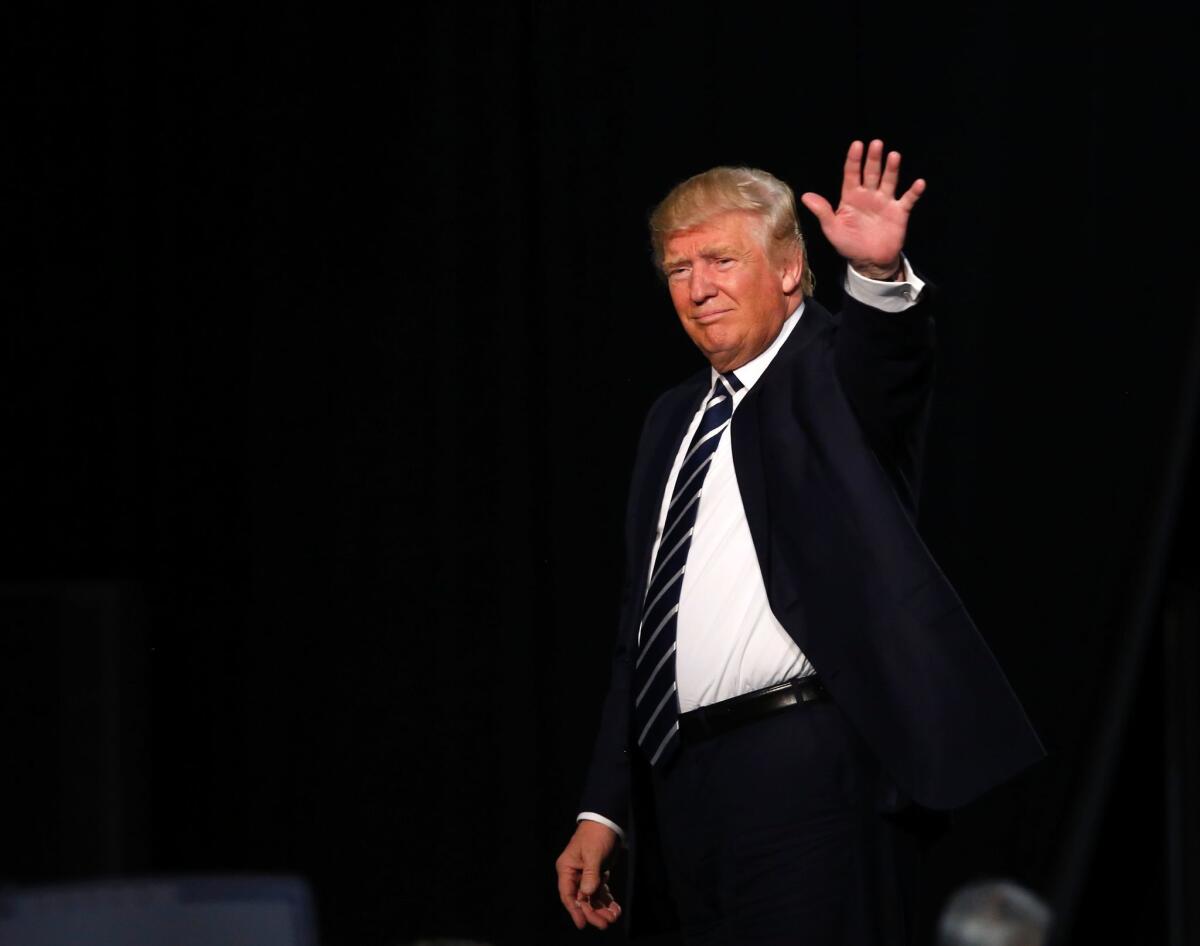Trump’s shocking victory could squeeze Silicon Valley on immigration and trade

- Share via
In October, a Donald Trump supporter stood up at a Santa Monica technology conference and berated billionaire tech entrepreneur Mark Cuban for being dismissive of Trump.
Cuban, the Dallas Mavericks owner who built his wealth in online radio streaming in the mid-90s, had said Trump wasn’t a viable option for president.
The exchange went on for minutes, but instead of losing his cool, Cuban told the audience that having your views challenged can only make people and companies stronger.
That’s what the technology industry — who rallied against Trump’s campaign and dug deep into their coffers to fight his candidacy — is now counting on after Trump’s surprising presidential win Tuesday night.
“Things are never as bad as they look, and things are never as good as they look,” said Ajay Chopra, a partner at venture capital firm Trinity Ventures.
Investors such as Adam Lilling of Los Angeles investment firm Plus Capital also saw a silver lining to the news that had plunged many Californian techies into mourning.
“In times of recession or depression, people become more entrepreneurial,” he said. “In times of expansion, great businesses grow.”
But even with a positive attitude, the technology industry must now grapple with what Trump’s presidency will mean for the sector, which relies heavily on global trade, offshore labor and foreign skilled workers — all issues Trump has campaigned against.
So-called skilled immigration has long been a sticking point for Silicon Valley, which heavily recruits overseas engineers and coders to meet its technical labor shortage. In 2013, industry leaders such as Facebook Chief Executive Mark Zuckerberg, LinkedIn co-founder Reid Hoffman, Yahoo CEO Marissa Mayer and venture capitalist Ron Conway helped launch FWD.US, an organization that lobbied for immigration reform that would open the doors for more foreign workers to enter and stay in the U.S.
“To lead the world in this new economy, we need the most talented and hardest-working people,” Zuckerberg said in an op-ed penned that year. “Given all this, why do we kick out the more than 40% of math and science graduates who are not U.S. citizens after educating them? Why do we offer so few H-1B visas for talented specialists that the supply runs out within days of becoming available each year?”
A question mark now hangs over whether any potential immigration reform under during the Trump administration will boost the technology industry, or close America even further off from overseas skilled workers.
“His anti-immigration stance is potentially the most obvious issue for technology companies,” said Dan Ridsdale, head of technology at Edison Investment Research. “But while he has stated his opposition to the H-1B specialty occupation nonimmigrant visa, he has also said that he supports highly skilled immigration.”
It’s a head-scratcher, then, because those who qualify for H-1B visas are, by definition, highly skilled workers.
"The fact is students around the world are going to think twice before moving to the Bay Area, and we're going to have access to less talent," said Cedric Bru, chief executive of Taulia, a 250-person financial tech start-up, which hires people on H-1B visas.
Mohammed Jalil, 30, said Wednesday that he was now questioning his decision to move his software start-up to San Francisco from London to be closer to customers. He also wondered whether he and his employees want to raise their families in a country that backed a candidate who Jalil believes fosters xenophobia and racism.
“Ideally, you want to minimize risk as a founder and this throws a big curve,” said Jalil, whose company, SyncSpot, is developing artificial intelligence software to design marketing rewards programs. “That’s why this is a big issue personally and for the business.”
Uncertainty also looms over whether Trump’s rhetoric on China and beyond will affect how U.S. companies do business abroad.
“Companies such as Apple, for whom China is an important export market, may well suffer from the backlash,” Ridsdale said.
But there will be other issues whose outcomes depend on whether Trump carries out his election promises.
Like Great Britain’s vote to exit the European Union, Trump’s win lands businesses in largely uncharted territory and, as investor Fred Wilson wrote on his website Wednesday morning, “If there is anything that investors hate, it is uncertainty.”
A report released Wednesday morning by the Information Technology and Innovation Foundation noted that Trump’s policies did not detail his position on issues such as supporting start-ups, digital free trade, Internet governance, artificial intelligence or open data.
But, echoing tech’s optimists who believe whatever challenges you face can only make you stronger, Wilson had this to offer to tech start-ups: “Don’t panic and don’t confuse uncertain times with a lack of opportunity.”
Twitter: @traceylien
UPDATES:
3:30 p.m.: This article was updated with additional information.
1:31 p.m.: This article was updated with additional information.
This article was first published Tuesday at 11:59 p.m.




